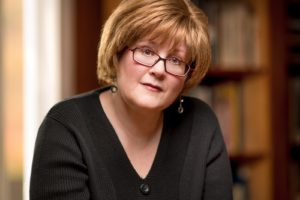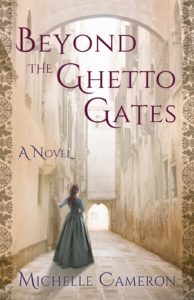FOR IMMEDIATE RELEASE:
‘Beyond the Ghetto Gates’ is a story of finding love and life in a time of upheaval
CHATHAM, New Jersey – A coming-of age story wrapped up in startling historical events, Michelle Cameron’s Beyond the Ghetto Gates (She Writes Press, April 7, 2020) reveals a time in history few know about. Influenced greatly by her experience living in Israel for more than a decade and learning of Napoleon’s history with Italy’s ghetto gates, Cameron weaves a dynamic tale shedding light on the conflict between assimilation and preserving religious tradition.
When French troops occupy the Italian port city of Ancona, freeing the city’s Jews from their repressive ghetto, two very different cultures collide. Mirelle, a young Jewish maiden, must choose between her duty — an arranged marriage to a wealthy Jewish merchant — and her love for a dashing French Catholic soldier. Meanwhile, Francesca, a devout Catholic, must decide if she will honor her marriage vows to an abusive and murderous husband when he enmeshes their family in the theft of a miracle portrait of the Madonna.
Despite being set more than 200 years in the past, Cameron incorporates timely issues into the book’s narrative, including parallels to the #MeToo movement and today’s rising antisemitism as Mirelle grapples with issues of intermarriage while balancing love and familial duty.
“A gripping peek into a bygone Italy and an astute look at the era’s prejudice.” — Kirkus Review
 MICHELLE CAMERON is a director of The Writers Circle, an NJ-based organization that offers creative writing programs to children, teens, and adults, and the author of works of historical fiction and poetry: Beyond the Ghetto Gates (She Writes Press, 2020), The Fruit of Her Hands: The Story of Shira of Ashkenaz (Pocket, 2009), and In the Shadow of the Globe (Lit Pot Press, 2003). She lived in Israel for fifteen years (including three weeks in a bomb shelter during the Yom Kippur War) and served as an officer in the Israeli army teaching air force cadets technical English. Michelle lives in New Jersey with her husband and has two grown sons of whom she is inordinately proud. Visit her website for more information https://michelle-cameron.com.
MICHELLE CAMERON is a director of The Writers Circle, an NJ-based organization that offers creative writing programs to children, teens, and adults, and the author of works of historical fiction and poetry: Beyond the Ghetto Gates (She Writes Press, 2020), The Fruit of Her Hands: The Story of Shira of Ashkenaz (Pocket, 2009), and In the Shadow of the Globe (Lit Pot Press, 2003). She lived in Israel for fifteen years (including three weeks in a bomb shelter during the Yom Kippur War) and served as an officer in the Israeli army teaching air force cadets technical English. Michelle lives in New Jersey with her husband and has two grown sons of whom she is inordinately proud. Visit her website for more information https://michelle-cameron.com.

“Beyond the Ghetto Gates”
Michelle Cameron | April 7, 2020 | She Writes Press
ISBN: 9781631528507 | Paperback: $16.95 | E-book: $9.95
Historical Fiction
Early praise for Beyond the Ghetto Gates:
“With vivid clarity and keen historical insight, Michelle Cameron sweeps us into the unusual setting of Italy during the Napoleonic invasion, and the plight of two courageous women of different faiths, who must fight for their right to love and live during a time of tumultuous upheaval.” ― C.W. Gortner, international best-selling author of The Romanov Empress
“Beyond the Ghetto Gates is a timeless coming-of-age story.” — 4 star Foreword Clarion Review
“Cameron shines a light on a rarely explored facet of the Napoleonic era set in the Italian provinces with a spirited Jewish woman at its center. Laced with vibrant detailing and endearing characters.” — Heather Webb, international best-selling author of Becoming Josephine and co-author of Ribbons of Scarlet
“An intimate coming-of-age story. A defining moment in European and Jewish history. Riveting and memorable.” ― Mitchell James Kaplan, award-winning author of By Fire, By Water
“A totally new and fascinating view of Napoleonic Europe, teeming with well-researched historical detail and characters you’ll root for on every page.” ― Nancy Bilyeau, author of The Blue
In an interview, MICHELLE CAMERON can discuss:
- The little-explored history of Napoleon’s destruction of the ghettos of Ancona and throughout Italy
- Writing historical fiction, the research that goes into her titles, and how she balances fact and fiction
- Her experience living in Israel and how that has influenced her writing
- Her past titles and advice for authors who are just starting out
- The nuances of the publishing world and the knowledge she’s acquired as a well-seasoned hybrid author
- Being the director of The Writers Circle organization and how helping other writers has influenced her own
An Interview with MICHELLE CAMERON
1. Where did you first learn about Napoleon’s history with the ghetto gates? What prompted you to write about this fairly unknown part of history?
After writing about the rise of antisemitism in Europe in my first historical novel, The Fruit of Her Hands, I longed to find a positive epoch in Jewish history to write about. I first read about Napoleon’s encounter with the Italian ghettos in Michael Goldfarb’s book, Emancipation: How Liberating Europe’s Jews from the Ghetto Led to Revolution and Resistance. The episode of how the young general used his Jewish troops to demolish the gates in Ancona and throughout Italy simply demanded to be told.
2. What challenges do you face in writing historical novels for a 21st century readership?
It can be challenging to balance the historical record with our 21st century sensibilities and expectations. There are so many competing calls for our attention that didn’t exist for 18th and 19th century readers, which means the book needs to be paced more quickly and include issues that today’s readers will resonate with – but without sacrificing period accuracy. Whenever I begin writing a historical piece, I often have difficulty with what is called the “feisty heroine” – because most women of that time simply didn’t have our opportunities to realize their full potential. But today’s readers want to project themselves into the characters they read about, so a passive heroine simply won’t do.
3. You say you knew you wanted to be an author from the age of 10. Can you walk us through your journey as a writer?
While I began writing early on – and completed three novels in my 20s that I’m frankly grateful never saw the light of day – life kept intervening and by the time I was a mother with young children, I’d given up on my publishing ambitions. But then my youngest son started writing simply for the love of it, which reminded me why I did it in the first place. I started by writing poetry (which you can do in the dojo waiting room or in the ball field) and slowly began to publish these shorter pieces. In time, I had enough narrative poems to shape a verse novel – In the Shadow of the Globe – and recognized that I was more a storyteller than a poet.
4. Your past titles (In the Shadow of the Globe and The Fruit of Her Hands) are very different than this latest. What did you learn from these works that you brought to this new title and what did you do differently?
While In the Shadow of the Globe is a completely different genre, it began with research and characters I developed for a young adult novel about Shakespeare that I completed, but never published. Similarly, Beyond the Ghetto Gates actually had its roots in a historical novel about the Jews gaining emancipation during the French Revolution that I shelved. Not that I recommend this method to other writers, but it is certainly a thorough way to gain perspective on your characters! As for The Fruit of Her Hands, while it is set in a very different period, I found certain themes that spoke to me – including dealing with antisemitism, the pull of assimilation, and a woman’s desire to be more than society allows her – that are strong components of Beyond the Ghetto Gates.
5. Beyond the Ghetto Gates deals heavily with the tension between the desire to be secular and maintaining religious heritage. What has been your experience with that tension?
I identify strongly as a secular Jew and just as strongly as someone with deep cultural roots in her heritage and religion. It’s not an easy balance, frankly. But my Judaism is a significant part of my identity, and certain moments – music, customs, events, and the increasingly frightening news – move me in ways nothing else does.
6. Can you describe your experience living in Israel for over 10 years?
I resisted the whole idea – I was just turning 15, after all! – but we arrived just months before the Yom Kippur War and my boarding school was mere miles away from the Syrian border. You acclimate quickly in a bomb shelter! I completed school, attended the army, and began my married life there. There is no place on earth where it is easier to be Jewish – secular or not.
7. With this now being your third title as a published author, what advice would you give authors who are just starting out?
Don’t stint on making your work as good as you can – and that means writing with passion, not shortcutting the long process of revision, being open to critique while keeping true to your personal vision. At The Writers Circle, I teach aspiring novelists who slowly come to realize how much of a marathon writing a novel is. I tell them to develop a hard outer skin. Rejection is simply a reality in the publishing world, especially today. (And yet, as one of my previous agents would say: “it only takes one!”)

A former award-winning journalist with national exposure, Marissa now oversees the day-to-day operation of the Books Forward author branding and book marketing firm, along with our indie publishing support sister company Books Fluent.
Born and bred in Louisiana, currently living in New Orleans, she has lived and developed a strong base for our company and authors in Chicago and Nashville. Her journalism work has appeared in USA Today, National Geographic and other major publications. She is now interviewed by media on best practices for book marketing.

